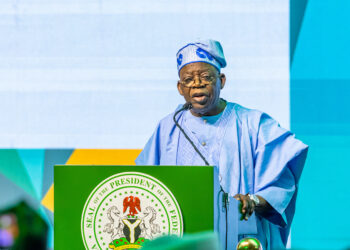- President Bola Tinubu sets up the policy advisory council after winning the polls to stimulate the Nigerian economy and improve energy security.
- The council’s report highlights challenges in the oil and gas sector, including oil theft and lost investments, and proposes interventions to increase oil production and power generation while transitioning to clean energy by 2060.
- The president’s decisions to unify the exchange rate, end fuel subsidies, and prioritize security restructuring signal a commitment to economic growth and diversification.
President, Bola Tinubu, after his victory at the polls, set up the policy advisory council to give recommendations on how to stimulate the economy, among other functions.
Just before his inauguration on May 29, the Energy and Natural Resources subcommittee of the policy advisory council submitted a report on the Nigerian energy and natural resources sectors with the vision to “unlock Nigeria’s energy potential to fuel economic growth and diversification while improving energy security sustainability.”
The 35-page document analyzes the challenges in the sector and proposes interventions.
Nigeria currently has a revenue-to-GDP ratio of 7%, a reduction of almost 100% from 13.5% between 2010 and 2014.
The Nigerian oil and gas sector is arguably the country’s most important sector, as it’s the sector where the country generates most of its revenue.
However, the sector is plagued with a series of problems that have affected its optimal functioning.
One of the sector’s top problems is oil theft. According to the council’s report, Nigeria lost $46.16 billion to oil theft between 2009 and 2020.
Also, the sector has lost $70 billion worth of investments in the petroleum industry since 2011; this is coupled with $10.7 billion lost annually to fuel subsidies. The untapped resources of gas are also an issue.
The current state of the Nigerian energy sector is quite worrisome, considering its importance to the Nigerian economy.
The sector is currently underperforming and does not adequately stimulate the Nigerian economy.
The recommendations largely focus on the oil and gas sector, with the potential to use the sector as a catalyst to diversify the Nigerian economy.
This analysis takes a look at the recommendations from the subcommittee, and Nigerians should be excited. Some of the recommendations were listed as being achieved in the first 100 days, and decisions such as the unified exchange rate have been made.
Unification of the exchange rate
For years, the country has operated with a dual exchange rate, which has led to official and parallel market rates. This move led to an influx of more individuals getting access to FX and selling them at a high price.
On June 14, it was announced that there would be a unified rate.
This will lead to more transparency and, with the right implementation, allow FX to be easily accessible at financial institutions.
End fuel subsidies
During the electioneering process, President Bola Tinubu was vocal and insisted that fuel subsidies must be removed as they harm the country’s economy more.
In his speech during his inauguration, he announced that the fuel subsidy was gone. This decision is expected to save the country $4.5 trillion annually.
This amount in the past ended up in the pockets of a few, but it will now be beneficial to Nigerians as more infrastructure can be provided, among other things.
Signal determination to end insecurity
The Nigerian state has been bedevilled by insecurity for the last twenty years or so.
Also, most oil-producing states like Imo, Rivers, Bayelsa, Akwa-Ibom, and others have had their share of insecurity and pipeline vandalism.
On June 19, the president, in a move to restructure the security architecture of the country, approved the retirement of the service chief and the appointment of new service chiefs, including the IGP and National Security Adviser (NSA).
Increase oil production
Over the years, Nigeria’s oil production has dwindled, thanks to oil theft and a lack of outdated equipment in the sector.
At a point, Nigeria lost its status as Africa’s largest oil producer and produced under 1 million BPD. In the medium term, the council state plans to restore Nigeria’s production back to 2.5 mbpd and 4 mbpd by 2030.
This, along with an increase in Nigeria’s refining capacity from 475 kbpd to 1.36 mbpd, will improve the country’s exports, as we will export without having to spend more on the importation of PMS.
Increase power generation
The unavailability of electricity currently affects all of Nigeria’s sectors and the daily lifestyle of the average Nigerian.
With a generating capacity of 16.4 GW, almost half of Nigeria’s population does not have access to on-grid electricity, which means they have to look for alternative sources of electricity to go about their daily activities and run their businesses.
For business owners and manufacturers, the cost of providing electricity is added to the cost of goods and services provided, leading to a rise in the cost of living.
The council proposed an increase to 25.30 GW by 2030, which will see more people have access to electricity and more stable access for Nigerians.
Net Zero by 2060
Presently, Nigeria does not have access to clean energy. Alternative sources of energy, such as generators, contribute largely to Nigeria’s unclean energy access.
With Nigeria as a participating country at COP26, the country is on the path to moving from fossil fuels to clean energy.
The actions from the implementation are expected to see oil and gas serve as a way to diversify the country’s economy and lead to economic growth in sectors like agriculture and fertilizer, research and development, construction, and manufacturing, among others.
The report will see the country’s Gross National Income (GNI) per capita rising from its current $5000 to $19,166 by 2049. Also, a reduction in the unemployment rate from 33% to 8%.




















Any actions that do not impact the supply side of dollars is useless